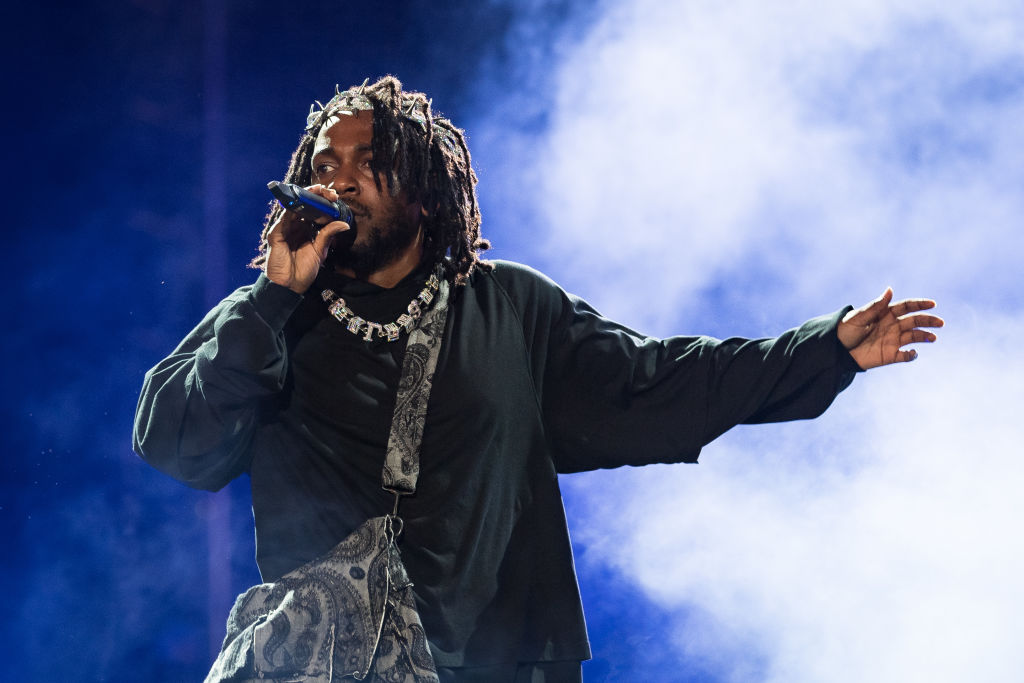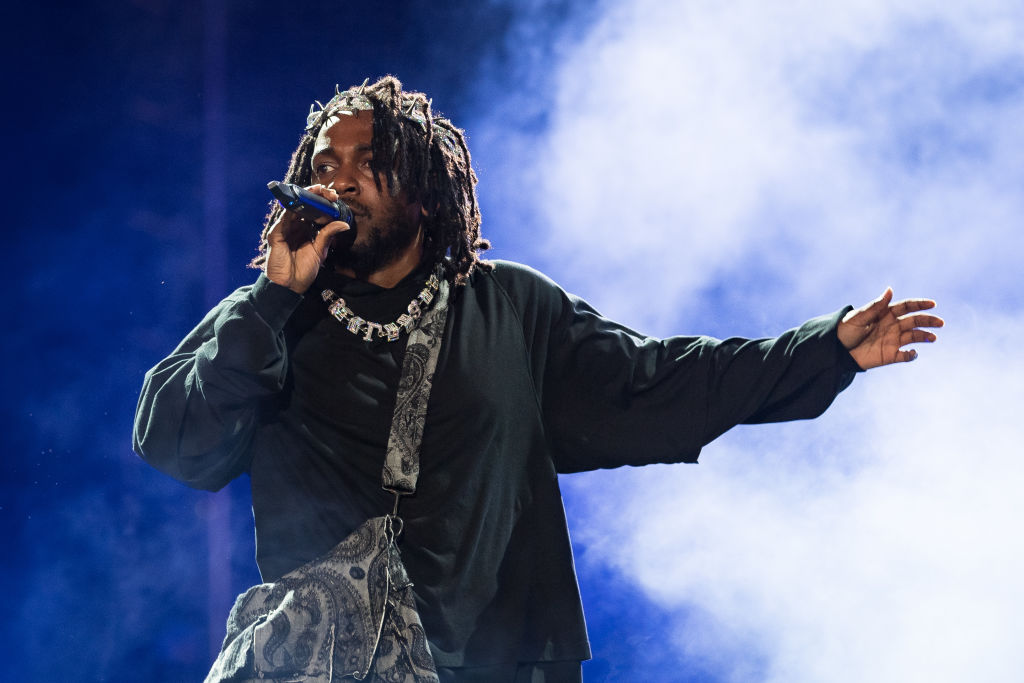
Image credits: Jason Koerner / Contributor / Getty Images
We all seem to agree that Kendrick Lamar defeated Drake in one of the most heated rap battles of the past decade. To add insult to injury, Drake landed himself in legal hot water when he deepfaked the late rapper Tupac.
Tensions between Lamar and Drake go back decades, but this latest feud began last fall when J. Cole released a song in which he called Drake, Lamar, and himself rap's “Big Three.” Ta. In March of this year, Lamar finally responded, rejecting Cole's claims in scathing words disparaging Cole and Drake. A fight broke out, and soon legions of other hip-hop artists joined the fray, releasing music and taking sides against Drake.
The weeks-long controversy escalated into one of the most heated rap battles of the digital age. There was a side fight (between Chris Brown and Quavo) and a white flag (J. Cole apologized to Lamar and deleted his diss to Lamar). meanwhile, Campaign created by social media Gifts for Drake and support for his diss tracks from Japanese Rap indian classical dance.
The feud also sparked a debate about when and how AI should be used in music, as well as the growing role of technology in rap beefs.
The defining moment came with the track “Taylor Made,” in which Drake attempted to diss Lamar using AI vocals from Snoop Dogg and rap icon Tupac, who died decades ago. Drake did not have permission from Tupac's estate to use Tupac's vocals and was threatened with legal action if he did not remove the track. Although Drake dropped it, his decision to use AI vocals sparked debate among music lovers and technologists alike.
(Lamar and Drake could not be reached for comment at the time of publication.)
Rap battles are chronically online
Artists like Tupac, who passed away in 1996, cannot imagine that artificial intelligence could emulate his voice so convincingly, allowing one of today's most popular rappers to insert his voice into a song. There probably wasn't. He also couldn't understand how the social nature of the Internet would shape the future of music.Every stream is a vote”
In the early '80s, rappers had to give interviews, get diss tracks played on the radio, and release physical albums and mixtapes during long-running feuds. Replying to a diss could take up to several days, but now it can take just seconds.
Within 20 minutes of Drake dropping the track against Lamar, Lamar issued a diss response to Drake. Lamar hinted that there was a leak in Drake's camp that allowed for his precipitous fall, which is a diss in itself. This speed was not possible before the Internet became so popular.
Drake released two songs within four days in response to his feud with Meek Mill nearly a decade ago. However, Lamar dropped four songs in five days during this fight, two of which were released in one day. As one founder recalled during the infamous feud between Jay-Z and Nas, no one had to rush out to buy a CD or pull over to listen to the radio. Instead, the track was immediately dropped on his YouTube, shared on Twitter, and then played on loop on Spotify.
The speed of these releases also has a downside. In another viral moment, Lamar's lyrics confused actor Haley Joel Osment and televangelist Joel Osteen.
It appears that real-time posts about rap have influenced Drake, with fans even calling him “chronic online” during rap battles. Some fans accused him of referring to popular tweets and memes people made about him during the uproar, passing it off as if it was his own idea, and rapping about it. Many people online commented that it felt like Drake was writing his response specifically to listen to his fans, rather than to reply to Lamar. That near-instantaneous feedback loop was in stark contrast to Lamar's raps, which were only scathing attacks on Drake.
This battle is also perhaps the first time such a beef has extended broadly to a technology platform. Lamar fans used Google Maps to virtually destroy Drake's mansion and rename it “Kendrick Owned.” Streamers have been playing for hours on platforms like Twitch, YouTube, and Kick, waiting to see if they can be among the first to react to newly dropped songs.
Popular music YouTuber Anthony Fantano has released over six different live reaction videos reacting to Drake and Lamar songs that have dropped in the past two weeks.These kinds of reaction video It was so popular that the creators lamar says (or his team) removed the copyright restrictions from these songs. mean them You can make money from your videos. This move alone could give further meaning to the role of hip-hop's reaction critics.
AI enters chat
The feud between Kendrick and Drake is also the first mainstream rap battle to use AI.
Artists across genres consider the coexisting threats and possibilities of this technology. Some are embracing AI as an opportunity. Her Yacht, an art-pop duo, trained an AI with 14 years of music to create their record “Chain Tripping” in 2019. Holly Herndon and Grimes have developed a tool for other artists to generate AI deepfakes of him using their own voices. Other artists, including Billie Eilish, Nicki Minaj and Katy Perry, have also spoken out against the use of AI to undermine human creativity.
Consent is a major concern in artists’ discussions about AI-generated music. Artists care so much about what their peers are doing because the use of AI concerns them all. Without an artist's knowledge, her music could be used to train her AI model, which another artist is using to complement her music.
While Herndon is at the forefront of musical experimentation with AI, he also advocates for artists to maintain control over their work. She uses AI in her art, but she's also the founder of Spawning, a startup that creates tools for artists to help remove their work from common AI training datasets. Meanwhile, chillwave musician Washed Out has just released his controversial music video, which was made entirely using Open AI's text-to-video model called Sora, but has yet to be released to the public. not.
Tupac's heirs will argue that Drake crossed the line because he didn't give consent to imitate the late rapper. But Rich Fortune, co-founder of AI-powered social planning app Hangtight, said it was creative for Drake to be one of the first artists to use AI in a song, especially a diss track. . Fortune says, “There are no rules in battle.''
“If there was ever a time to know what the reaction would be, it would be now, because you can't throw punches in a war,” he continued. Now that Drake, one of the biggest artists in the world, has effectively approved the use of his AI vocals, he believes more artists will ask to use his AI vocals in the future.
In fact, one of the diss tracks against Drake in this feud used AI-generated production and has since become a meme against him.Producer Metro Boomin is in charge. BBL Drizzy AI song He then sampled it into a track that became one of the rallying cries for rappers.
Meanwhile, great artists like Beyoncé are taking a stand against the growing presence of AI. In one of the few public comments she made about her genre-bending album, Cowboy Her Carter, Beyoncé said: I wanted to go back to a real instrument using artificial intelligence and digital filters and programming. ”
Fortune said the biggest hurdle right now for artists who want to use AI is getting permission. A living artist may not be all that keen on being replicated with AI, but a deceased musician's estate may be. The problem is that many dead old school artists, like Tupac, cannot consent to AI-generated music being imitated because the technology was not invented during their lifetime.
“I don't know if it's necessarily a good thing, but that's the direction we're heading in,” Fortune said of utilizing the late musician's work. At the very least, he said, it would open up a new source of income for the estates of artists who don't mind being artificially reincarnated.
Kendrick and Drake's feud also brought to light another point about AI. It has the potential to emulate artists with not-so-unique styles. Luke Bailey, founder of fintech group Neon Money Club, said Drake's recent music lacks depth. This, combined with the suspicion that Drake was very directly and deliberately inspired by things he saw on the internet, suggests that he's not doing anything that an AI bot might someday do. This is causing concern.
“There are two types of musicians: those who can play exactly what someone tells them to do, and those who can create something original from scratch,” Bailey said. “At this stage of development, AI is the former.”
Bailey is right. Large-scale language models (LLMs), the type of artificial intelligence that powers most deepfake tools, are inherently uncreative. These models respond to user-generated prompts by synthesizing vast amounts of data and predicting the most likely responses.
However, the most famous music often takes the opposite approach. Look at Kendrick Lamar. The rapper's bars are so complex that he remains the only non-classical and jazz musician to win a Pulitzer Prize. He is often considered a leading voice in the music world and is known for his commentary on race and politics. His current AI lacks the cultural nuances to form its own ideas about society, let alone nuances like race.
“[AI] “You can't copy Kendrick's depth, you can only copy his voice,” Bailey said, adding that fans have heard some very convincing AI-generated Drake songs in the past. he added. “AI doesn’t have a strong bar yet.”


